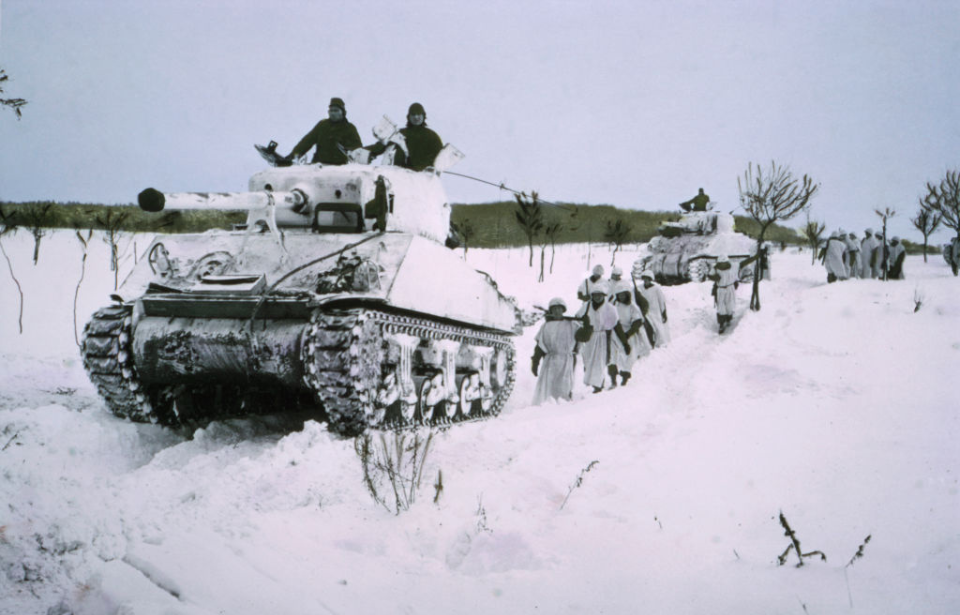When most people hear about a Christmas truce during wartime, they think of the famous one from 1914 that occurred along the Western Front. But a lot fewer know that a smaller, lesser-known truce also took place during the Battle of the Bulge in 1944. In the middle of one of World War II’s fiercest battles, soldiers on both sides briefly set aside the fighting to share a moment of Christmas peace.
Battle of the Bulge
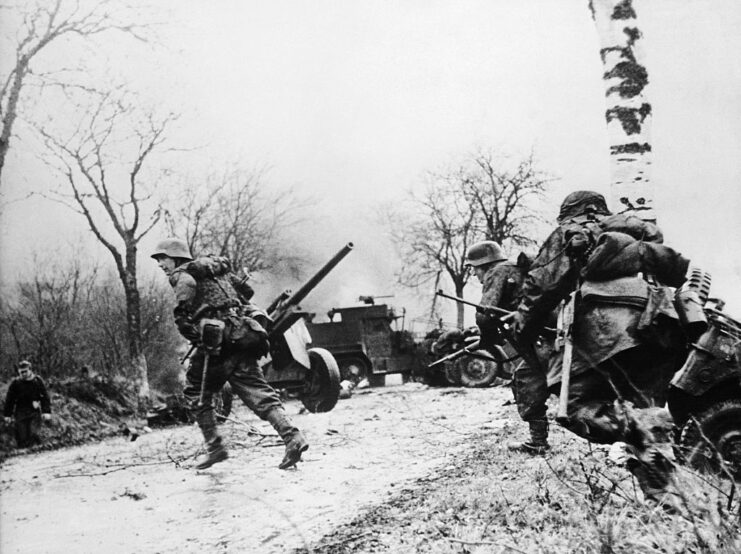
The Battle of the Bulge, which lasted from December 1944 to January 1945, was Germany’s final major offensive on the Western Front. After the Allies stormed the beaches of Normandy during D-Day and pushed across Europe, they paused in the dense Ardennes Forest region of Belgium to regroup, resupply, and prepare for the next phase of the war. With the cold setting in and rough terrain all around, most believed a German attack was unlikely.
But on December 16, the Germans launched a surprise assault with over 406,000 troops, aiming to split the Allied forces and capture the port of Antwerp. Fierce combat followed as both sides used the thick forests and freezing weather to their tactical advantage.
By Christmas, German troops were bogged down and surrounded in a narrow corridor near Foy-Nôtre-Dame. With Allied air support now in full effect and reinforcements arriving, the tide turned. The offensive collapsed, and by January 28, the Allies had secured a hard-fought victory.
Germany’s gamble had failed. The battle drained what was left of their strength in the West and left them unable to mount another major attack for the rest of the war.
A knock at the door on Christmas Eve
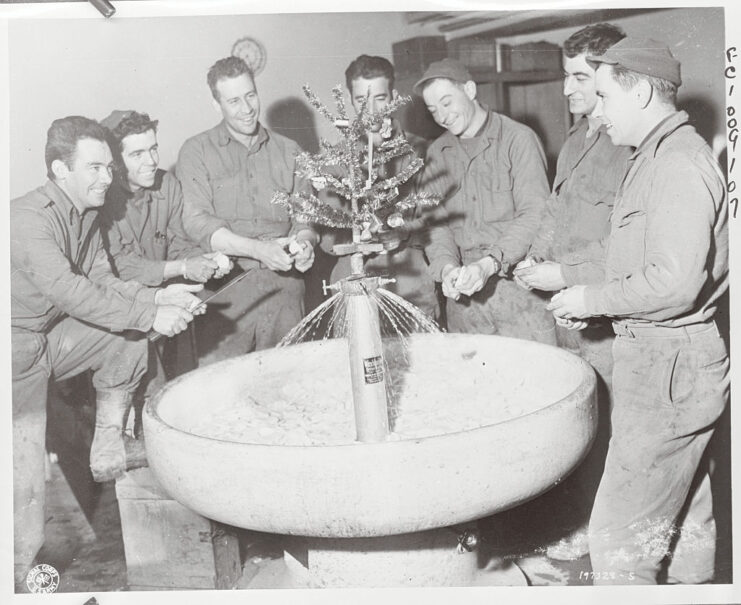
The battle in the Ardennes was intense and exhausting for soldiers on both sides, leaving them desperate for rest. A brief moment of respite came on Christmas Eve 1944, now remembered as a small truce in the midst of the fighting.
This story follows 12-year-old Fritz Vincken and his mother, Elisabeth. After their hometown of Aachen was destroyed by the ongoing war, they moved to the Hürtgen Forest in Germany, near the Belgian border. On Christmas Eve, they heard a knock at the door. When they opened it, they found three American soldiers, one of whom was badly wounded.
Even though the Americans didn’t speak German and the Vinckens didn’t understand English, they managed to communicate in French. Fritz’s mother welcomed the soldiers inside, and they shared a heartfelt exchange.
“We learned that the stocky, dark-haired fellow was Jim; his friend, tall and slender, was Robin,” Fritz later recalled. “Harry, the wounded one, was now sleeping in my bed, his face as white as the snow outside. They’d lost their battalion and had wandered in the forest for three days, looking for Americans, and hiding from the Germans. They hadn’t shaved, but still, without their heavy coats, they looked merely like big boys. And that was the way mother began to treat them.”
A second knock at the door
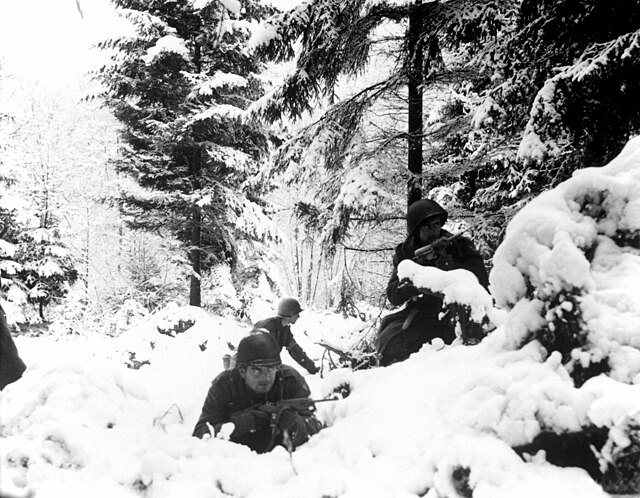
As Fritz Vincken’s mother prepared a meal of potatoes and a rooster for their guests, another knock came at the door. Thinking it might be more Americans, the 12-year-old opened it without hesitation—only to find four Wehrmacht soldiers standing outside.
The soldiers explained that they had been separated from their battalion and needed a place to stay until morning. Fritz felt a wave of anxiety, knowing that giving shelter to enemy troops—especially the Americans—was a crime punishable by death. Despite the risk, Elisabeth Vincken let the four men inside but made it clear that they were not the only guests and that they “may not consider friends.”
Although the Germans were initially upset, Elisabeth diffused the tension. “Listen. You could be my sons, and so could they in there,” she said. “A boy with a gunshot wound, fighting for his life, and his two friends, lost like you and just as hungry and exhausted as you are. This one night, this Christmas night, let us forget about killing.”
A short-lived truce on Christmas Eve 1944
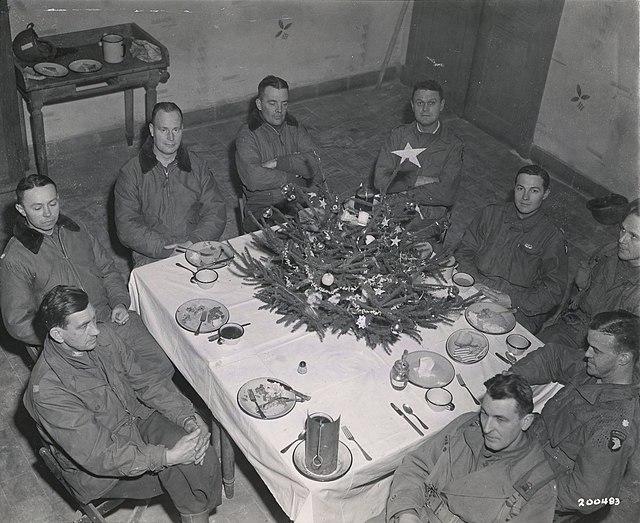
The Germans left their arms at the door and entered the Vincken residence, after which the Americans did the same. After some time, the group loosened up, realizing that, at that particular moment, they weren’t enemies fighting on the battlefield, they were men celebrating Christmas Eve together. Before long, everyone had tears in their eyes.
As Fritz explained, “Relaxation was now beginning to replace suspicion. Even to me, all the soldiers looked very young as we sat there together. Heinz and Willi, both from Colonge, were 16. [Their] German corporal, at 23, was the oldest of them all.”
The corporal pulled out a bottle of red wine from his bag, while Willi offered up the rye bread he had with him. After saying grace, the unusual group – an innocent mother and her young son, three American soldiers and four Germans – began eating their meal, all hungry after a long day. One, who’d been a medical student before the Second World War, even looked at Harry, deeming that he needed “rest and nourishment” and adding that the cold temperatures had saved him from infection.
“Just before midnight, Mother went to the doorstep and asked us to join her to look up at the star of Bethlehem. We all stood beside her except Harry, who was sleeping,” Fritz recalled. “For all of us during the moment of silence, looking at the brightest star in the heavens, the war was a distant, almost-forgotten thing.”
Going their separate ways on Christmas Day
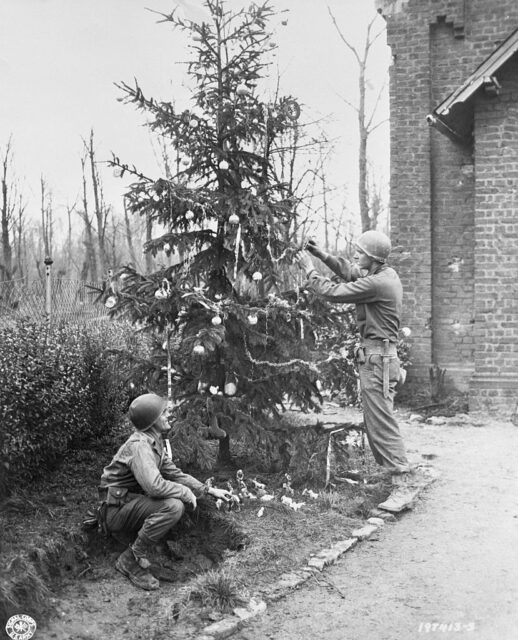
The next morning, everyone had a simple breakfast, including Harry, who had regained some strength overnight. After that, they made a stretcher using two poles and the Vinckens’ tablecloth so the two American soldiers could carry their wounded comrade. Before heading out, the three Americans checked their location on a map and, with the help of the German corporal, planned their route back to their own troops. The 23-year-old German even gave them a compass.
Soon after, both the Germans and Americans were given back their weapons. They shook hands and parted ways. As they left, Elisabeth said goodbye, telling them, “Be careful, boys. I want you to get home someday where you belong. God bless you all!”
Fritz Vickens hoped to reunite with the soldiers one day
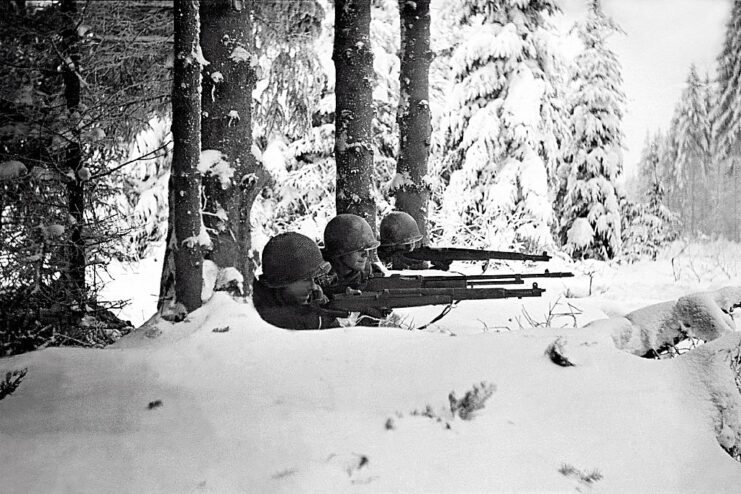
Just before World War II came to an end, Fritz Vincken’s father, Hubert, returned home to his family. In 1959, he emigrated to the United States and opened a bakery in Honolulu, Hawaii. While building a life for himself in the US, he always remembered the soldiers he met on Christmas Eve 1944 and the mini truce that had occurred in that small cottage in the Hürtgen Forest.
In 1953, aware his chances of seeing the men again were slim, Fritz published his story in Reader’s Digest, an article US President Ronald Reagan referenced in 1985. Nine years later, he appeared on an episode of Unsolved Mysteries (1987-2002), intending to bring his story to a wider audience.
The television appearance worked, with a nursing home chaplain in Frederick, Maryland, contacting the producers of Unsolved Mysteries to inform them of a resident who’d served with the 121st Infantry Regiment, 8th Infantry Division during WWII. Fritz flew to Maryland and met Ralph H. Blank, who, at 76, was in poor health.
Their reunion was captured on camera, with Ralph telling him that his “mother saved my life,” indicating he was the “Harry” in Fritz’s story. Following their meeting, he told the Honolulu Star-Bulletin, “Now I can die in peace. My mother’s courage won’t be forgotten and it shows that goodwill will do.”
More from us: Why Did Japan Attack Pearl Harbor?
Fritz added in a 1997 interview that Elisabeth’s actions during the Christmas truce in 1944 taught him an important lesson, “The inner strength of a single woman, who, by her wits and intuition, prevented potential bloodshed, taught me the practical meaning of the words ‘good will toward mankind.’ I remember mother and those seven young soldiers, who met as enemies and parted as friends, right in the middle of the Battle of the Bulge.”
